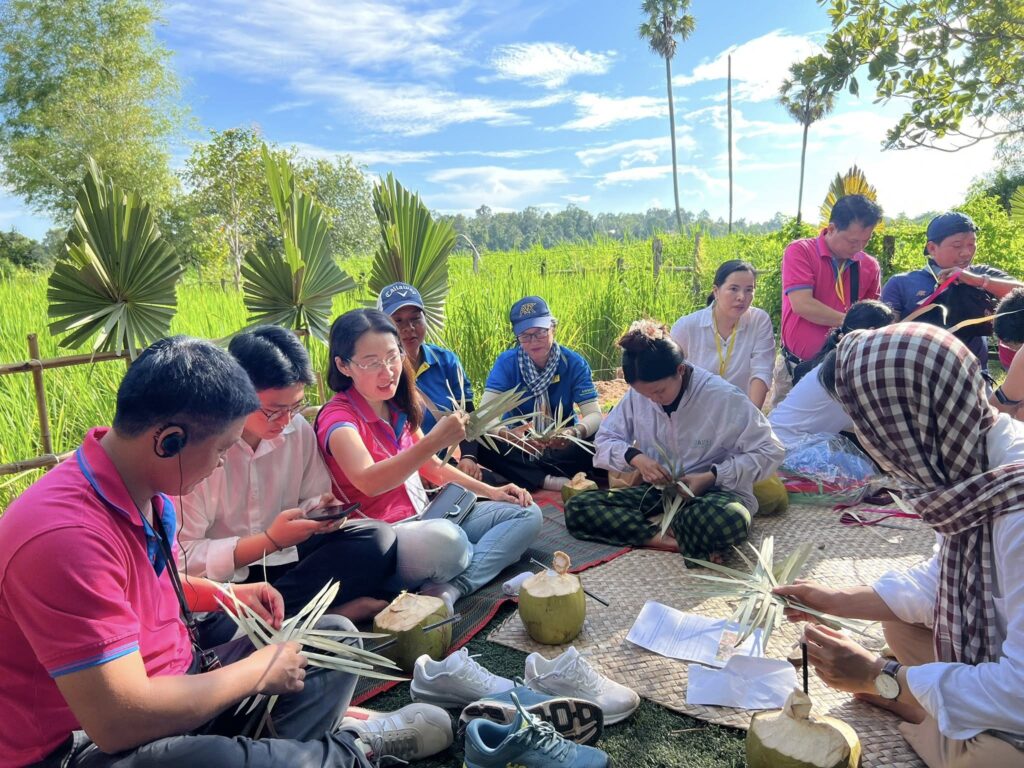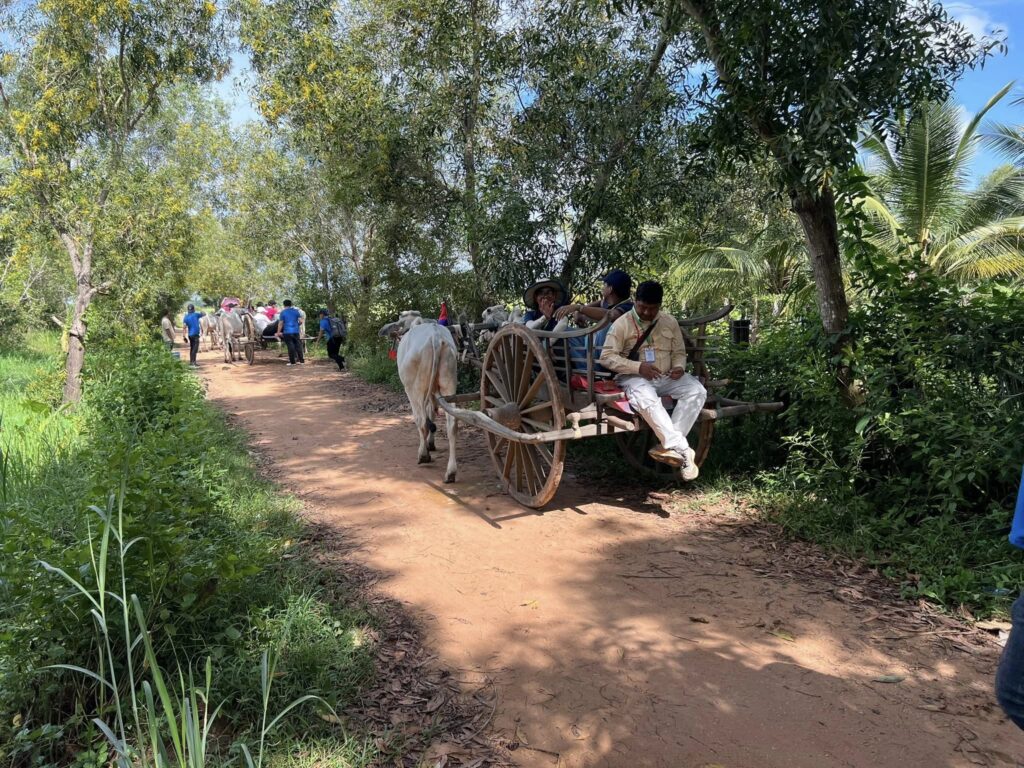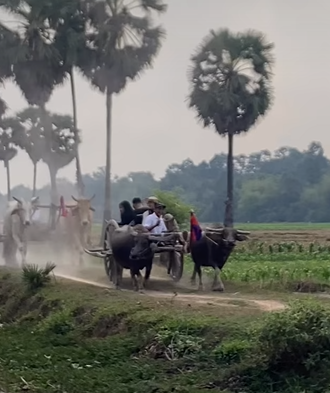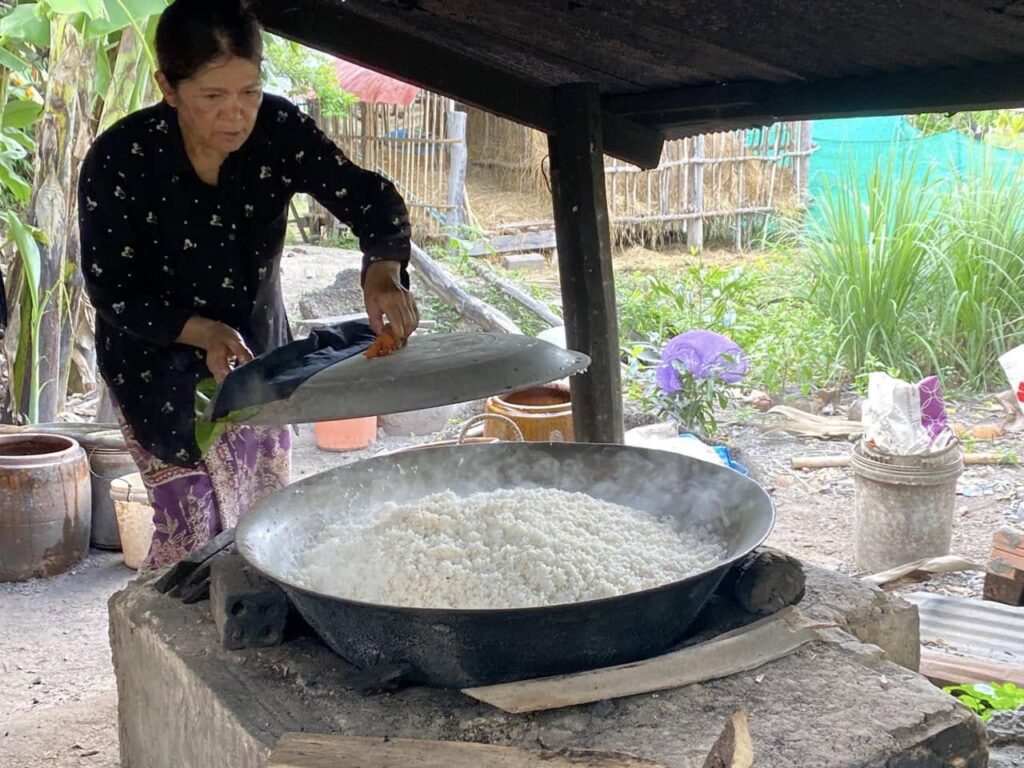- Dive into real Khmer village life,
meet local families, and support a thriving [doing well, or being successful] community –
a piece of sustainable tourism
You work at the front desk of a luxury hotel in Siem Reap.
A guest comes to you. He says he wants to see life and meet people in the countryside. You tell him about the Preah Dak Village Experience. It is a must when you are in Siem Reap.

Preah Dak is a small village near Siem Reap. It is a very special place. Here, visitors can see real Cambodian life. You can meet local families and learn about their daily work.
In Preah Dak, people make traditional food and handicrafts. Visitors can try cooking Khmer snacks. You can also see how villagers make sugar from palm trees or weave mats. It is fun and interesting. You can try these things yourself. This is why we say “get your hands dirty, heart full open.” You work with your hands and learn with your heart.
A visit to Preah Dak helps the community. When you buy snacks or handicrafts, the money goes to the families. It gives them income and supports their life. Also, by visiting, you help the village keep its culture and traditions.
Walking in the village, you see wooden houses, small temples, and rice fields. You meet children, farmers, and friendly people. It is quiet and peaceful.
Visiting Preah Dak is not only fun. It is a good way to learn, help, and enjoy real village life. Everyone can do something useful while seeing a beautiful and traditional place.
____________________
Vocabulary:
- an experience – something you do or see that teaches you or is interesting.
- dirty – not clean.
- daily work – the jobs or tasks people do every day.
- handicrafts – things made by hand, like art or tools.
- to cook – to make food ready to eat.
- a snack – a small amount of food between meals.
- to make sugar – to create sugar from plants or fruit.
- to weave a mat – to make a flat piece of cloth or grass by crossing threads or strips.
- to be fun – to be enjoyable or make you happy.
- community – a group of people who live in the same place or share the same life.
- an income – money people get for working or selling things.
- to support – to help someone or something.
- culture – the way people live, their ideas, art, and life.
- a tradition – something people do for a long time in their family or country.
- friendly – nice and kind to people.
- quiet – with little or no noise.
- peaceful – calm and not angry or noisy.
- to enjoy – to like something and be happy doing it.
- a village – a small town in the country.
- to do something useful – to do something that helps people or makes a good result.
##################
Multiple choice test:
1. What is “an experience”?
a) Something you carry when you go outside
b) Something people eat to get energy for the day
c) Something you see or do that teaches you something
2. What does “dirty” mean?
a) Looking new and nice in a good way
b) Not clean and covered with dust or mud
c) Very quiet and calm like a small garden
3. What is “daily work”?
a) Jobs or tasks people do every single day
b) Fun activities people do only during holidays
c) Games or activities people play sometimes at home
4. What are “handicrafts”?
a) Machines or tools that help people work faster
b) Objects made by hand like art, tools, or decorations
c) Objects people buy in shops to use at home
5. What does “to cook” mean?
a) To clean a room, a table, or a floor carefully
b) To fix furniture or other things at home
c) To make food ready to eat using heat or fire
6. What is “a snack”?
a) A small amount of food eaten between main meals
b) A big meal that people eat with friends or family
c) A type of drink you can have after school
7. What does “to make sugar” mean?
a) To wash sugar and put it into a container
b) To prepare salt or spices to use in cooking
c) To produce sugar from plants or fruits for eating
8. What is “to weave a mat”?
a) To make a flat piece using threads or grass
b) To make a small carpet by sewing pieces together
c) To cut grass or flowers and put them in a basket
9. What does “to be fun” mean?
a) To do something that is enjoyable and makes people happy
b) To do something hard that makes people feel tired
c) To do something quiet and calm without any movement
10. What is “community”?
a) A group of trees or plants growing in the same place
b) A group of people living together sharing life and help
c) A group of animals living together in the forest
————————-part 1———————–
11. What is “an income”?
a) Money people receive for work or selling things regularly
b) Money people spend to buy food or clothes
c) Money people give as a gift to friends or family
12. What does “to support” mean?
a) To ask someone to leave a place or situation
b) To help or give assistance to someone or something
c) To talk loudly to get someone’s attention quickly
13. What is “culture”?
a) The way people move or travel every day in a city
b) The way people live, believe, and act in society
c) The way people buy or sell things in the market
14. What is “a tradition”?
a) Something people do for a long time in families or countries
b) Something old that people throw away because it is broken
c) Something new that people try for the first time
15. What does “friendly” mean?
a) Quiet and shy and not talking to anyone
b) Angry or not speaking to other people
c) Being kind, helpful, and nice to other people daily
16. What does “quiet” mean?
a) Very fast or active with many movements
b) Making little or no noise in a place or moment
c) Very happy and excited like at a party
17. What does “peaceful” mean?
a) Calm, safe, and without noise, conflict, or problems
b) Very busy with many things happening at once
c) Full of problems or people fighting all the time
18. What does “to enjoy” mean?
a) To like something and feel happy while doing it
b) To do something that makes you tired or bored
c) To watch something without feeling happy or sad
19. What is “a village”?
a) A small town in the country where people live together
b) A house or apartment where only one family lives
c) A big city with many buildings and streets
20. What does “to do something useful” mean?
a) To make a flat piece using threads or grass
b) Objects made by hand, like art, tools, or decorations
c) To act in a way that helps people
Answers:
1-c, 2-b, 3-a, 4-b, 5-c, 6-a, 7-c,
8-a, 9-a, 10-b, 11-a, 12-b, 13-b, 14-a,
15-c, 16-b, 17-a, 18-a, 19-a, 20-c

———————-
Full version:
- What is “an experience”? Something you see or do that teaches you something
- What does “dirty” mean? Not clean and covered with dust or mud
- What is “daily work”? Jobs or tasks people do every single day
- What are “handicrafts”? Objects made by hand like art, tools, or decorations
- What does “to cook” mean? To make food ready to eat using heat or fire
- What is “a snack”? A small amount of food eaten between main meals
- What does “to make sugar” mean? To produce sugar from plants or fruits for eating
- What is “to weave a mat”? To make a flat piece using threads or grass
- What does “to be fun” mean? To do something that is enjoyable and makes people happy
- What is “community”? A group of people living together sharing life and help
- What is “an income”? Money people receive for work or selling things regularly
- What does “to support” mean? To help or give assistance to someone or something
- What is “culture”? The way people live, believe, and act in society
- What is “a tradition”? Something people do for a long time in families or countries
- What does “friendly” mean? Being kind, helpful, and nice to other people daily
- What does “quiet” mean? Making little or no noise in a place or moment
- What does “peaceful” mean? Calm, safe, and without noise, conflict, or problems
- What does “to enjoy” mean? To like something and feel happy while doing it
- What is “a village”? A small town in the country where people live together
- What does “to do something useful” mean? To act in a way that helps people
################

True or false:
- Making a small carpet using threads is called weaving a mat.
- Daily work is only done once a month.
- Community means a group of people living together and helping each other.
- Handicrafts are objects made by machines only.
- Cooking is preparing food using heat or fire.
- A snack is a small amount of food eaten between meals.
- Experience is something you see or do that teaches you something.
- To support someone means to help them or give assistance.
- To be fun means to make people bored or tired.
- Tradition is something people do regularly in families or countries.
- Dirty means not clean or covered with dust or mud.
- Culture is only about painting and music.
- To make sugar means to create sugar from plants or fruits.
- Making sugar means cooking rice in water.
____________________
False: 2,4,9,12,14
____________________
Full version:
- Making a small carpet using threads is called weaving a mat.
- Daily work is only done once a month. True is: Daily work is done every day.
- Community means a group of people living together and helping each other.
- Handicrafts are objects made by machines only. True is: Handicrafts are objects made by hand like art, tools, or decorations.
- Cooking is preparing food using heat or fire.
- A snack is a small amount of food eaten between meals.
- Experience is something you see or do that teaches you something.
- To support someone means to help them or give assistance.
- To be fun means to make people bored or tired. True is: To be fun means to do something enjoyable and make people happy.
- Tradition is something people do regularly in families or countries.
- Dirty means not clean or covered with dust or mud.
- Culture is only about painting and music. True is: Culture is the way people live, believe, and act in society.
- To make sugar means to create sugar from plants or fruits.
- Making sugar means cooking rice in water. True is: To make sugar means to create sugar from plants or fruits.
________________________
False: 2,4,9,12,14
##################
Gap-Fill Exercise – Preah Dak Community (shuffled)
- In Preah Dak, visitors can get their hands ______ while helping the villagers.
a) dirty
b) clean
c) cooked - Every morning, tourists join villagers in their daily ______.
a) festival
b) work
c) game - Guests can learn to make sugar from ______ in the village.
a) rice
b) sugar cane
c) trees - People in the village show visitors how to weave a ______.
a) mat
b) basket
c) shirt - Children in the village love to taste a small ______ between meals.
a) snack
b) festival
c) craft - Staying in Preah Dak lets visitors experience real rural ______.
a) city
b) music
c) culture - Helping the villagers allows tourists to ______ the community.
a) support
b) ignore
c) sell - Daily life in the village includes cooking, farming, and making ______.
a) toys
b) handicrafts
c) books - Visitors describe the experience as very ______ and enjoyable.
a) fun
b) boring
c) loud - Working with villagers gives them a small ______ for their help.
a) tool
b) income
c) gift - The village is quiet and peaceful, perfect to ______ the surroundings.
a) enjoy
b) ignore
c) avoid - Participating in local life allows tourists to learn about traditions and ______.
a) traffic
b) computers
c) culture - Guests often say the people in Preah Dak are very ______.
a) friendly
b) rude
c) shy - The Preah Dak experience is designed to do something ______ for the village.
a) boring
b) useful
c) useless
——————————
Answers:
1-a, 2-b, 3-b, 4-a, 5-a,
6-c, 7-a, 8-b, 9-a, 10-b,
11-a, 12-c, 13-a, 14-b
——————————
Correct version:
- In Preah Dak, visitors can get their hands dirty while helping the villagers.
- Every morning, tourists join villagers in their daily work.
- Guests can learn to make sugar from sugar cane in the village.
- People in the village show visitors how to weave a mat.
- Children in the village love to taste a small snack between meals.
- Staying in Preah Dak lets visitors experience real rural culture.
- Helping the villagers allows tourists to support the community.
- Daily life in the village includes cooking, farming, and making handicrafts.
- Visitors describe the experience as very fun and enjoyable.
- Working with villagers gives them a small income for their help.
- The village is quiet and peaceful, perfect to enjoy the surroundings.
- Participating in local life allows tourists to learn about traditions and culture.
- Guests often say the people in Preah Dak are very friendly.
- The Preah Dak experience is designed to do something useful for the village.
###################

Match the words with definitions
Words:
- experience
- dirty
- daily work
- handicrafts
- to cook
- a snack
- to make sugar
- to weave a mat
- to be fun
- community
- income
- to support
- culture
- tradition
Definitions:
a) Money people receive for work or selling things regularly
b) Objects made by hand like art, tools, or decorations
c) To act in a way that helps people
d) To produce sugar from plants or fruits for eating
e) Something people see or do that teaches them something
f) To make food ready to eat using heat or fire
g) A group of people living together sharing life and help
h) A small amount of food eaten between main meals
i) Being kind, helpful, and nice to other people daily
j) To make a flat piece using threads or grass
k) Something people do for a long time in families or countries
l) Not clean, covered with dust, mud, or dirt
m) Jobs or tasks people do every single day
n) To do something that is enjoyable and makes people happy
_______________________
Answers:
1-e, 2-l, 3-m, 4-b, 5-f,
6-h, 7-d, 8-j, 9-n, 10-g,
11-a, 12-c, 13-i, 14-k
_______________________
Correct version:
- experience – Something people see or do that teaches them something
- dirty – Not clean, covered with dust, mud, or dirt
- daily work – Jobs or tasks people do every single day
- handicrafts – Objects made by hand like art, tools, or decorations
- to cook – To make food ready to eat using heat or fire
- a snack – A small amount of food eaten between main meals
- to make sugar – To produce sugar from plants or fruits for eating
- to weave a mat – To make a flat piece using threads or grass
- to be fun – To do something that is enjoyable and makes people happy
- community – A group of people living together sharing life and help
- income – Money people receive for work or selling things regularly
- to support – To act in a way that helps people
- culture – The way people live, believe, and act in society
- tradition – Something people do for a long time in families or countries
####################
Interview with Thorn Bun about the Preah Dak Community experience:
enjoy – dirty – mats – skills – culture –
traditions – food – support –
visitors – learning –
snack –
village
Interviewer: Hello, Thorn Bun! Can you tell us what the Preah Dak Community experience is?
Thorn Bun: Yes! It is an experience where visitors can see and do things in the village that teach them about local life and __________.
Interviewer: What can visitors do first when they arrive?
Thorn Bun: They can get their hands __________ by helping with daily work like farming or cooking.
Interviewer: Do visitors cook during the experience?
Thorn Bun: Yes, they can cook __________ using local ingredients and learn how to prepare traditional dishes.
Interviewer: Can people make handicrafts there?
Thorn Bun: Yes, they can make handicrafts like weaving __________ or other handmade objects.
Interviewer: Is the experience fun for visitors?
Thorn Bun: Very fun! People enjoy helping and __________ new things in the village.
Interviewer: Do visitors try local snacks?
Thorn Bun: Yes, they can taste a __________ between meals and enjoy local flavors.
Interviewer: How does the community benefit from visitors?
Thorn Bun: Visitors __________ the community and give the people some income for their work.
Interviewer: What do visitors learn about culture and traditions?
Thorn Bun: They learn about the way people live, believe, and act, and about __________ in families and the village.
Interviewer: How would you describe the people in Preah Dak?
Thorn Bun: Very friendly! They are kind and helpful to __________ every day.
Interviewer: Is the village quiet and peaceful?
Thorn Bun: Yes, it is quiet and peaceful, perfect to __________ the surroundings and village life.
Interviewer: What is the most useful thing visitors do there?
Thorn Bun: They do something useful by helping with daily work and projects that support the __________.
Interviewer: Why should people visit Preah Dak?
Thorn Bun: Because it is a wonderful way to experience real village life, learn new __________, and help the community at the same time.
_______________________
Full version:
Interviewer: Hello, Thorn Bun! Can you tell us what the Preah Dak Community experience is?
Thorn Bun: Yes! It is an experience where visitors can see and do things in the village that teach them about local life and culture.
Interviewer: What can visitors do first when they arrive?
Thorn Bun: They can get their hands dirty by helping with daily work like farming or cooking.
Interviewer: Do visitors cook during the experience?
Thorn Bun: Yes, they can cook food using local ingredients and learn how to prepare traditional dishes.
Interviewer: Can people make handicrafts there?
Thorn Bun: Yes, they can make handicrafts like weaving mats or other handmade objects.
Interviewer: Is the experience fun for visitors?
Thorn Bun: Very fun! People enjoy helping and learning new things in the village.
Interviewer: Do visitors try local snacks?
Thorn Bun: Yes, they can taste a snack between meals and enjoy local flavors.
Interviewer: How does the community benefit from visitors?
Thorn Bun: Visitors support the community and give the people some income for their work.
Interviewer: What do visitors learn about culture and traditions?
Thorn Bun: They learn about the way people live, believe, and act, and about traditions in families and the village.
Interviewer: How would you describe the people in Preah Dak?
Thorn Bun: Very friendly! They are kind and helpful to visitors every day.
Interviewer: Is the village quiet and peaceful?
Thorn Bun: Yes, it is quiet and peaceful, perfect to enjoy the surroundings and village life.
Interviewer: What is the most useful thing visitors do there?
Thorn Bun: They do something useful by helping with daily work and projects that support the village.
Interviewer: Why should people visit Preah Dak?
Thorn Bun: Because it is a wonderful way to experience real village life, learn new skills, and help the community at the same time.
##############